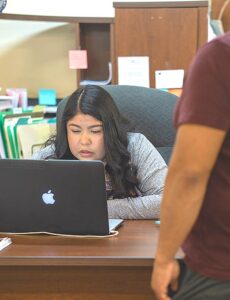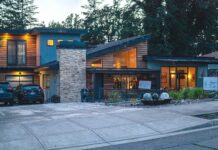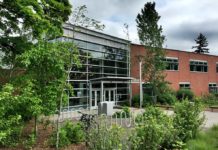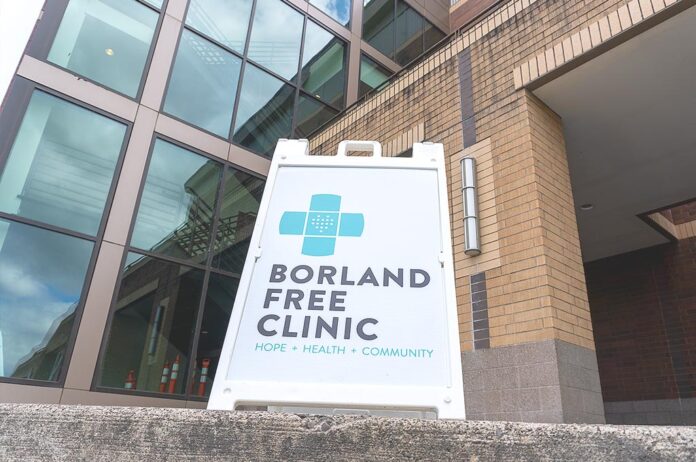
Borland Free Clinic, the only free medical clinic serving both Washington and Clackamas Counties, is building on its success. Literally.
The Clinic this month launched a capital campaign that will help the non-profit transform its clinic space in a remodel they hope is just the first step to expanding operating hours and reaching more people in need.
The $1.5 million project will replace the curtain screens of Borland’s four exam rooms with walls and doors, add two bathrooms and an onsite lab, enclose the administrative offices, add heat and air conditioning, create a prayer room, and create a private entrance to its space in the lower level of Rolling Hills Community Church, giving patients direct access without snaking past neighboring services, like a food pantry, that share the church’s basement.
“It seems like a dream come true,” says Medical Director Dr. Chelsea Ban. “It expands everything. There are so many things we cannot do without doors. I think it will allow other providers to volunteer more time with confidence because they’ll feel more comfortable.”
Some of the existing funds have already been used to get a jump on the build. The new front door is installed, and an HVAC unit is en route.
Ban, an OBGYN at OSHU, has been with the clinic from the start, and like the rest of the medical team, she’s a volunteer. She helped start the clinic in 2017 with a grant to provide diabetes education and screenings.
“I believe that medical care is as important as clean water and clean air,” she said.
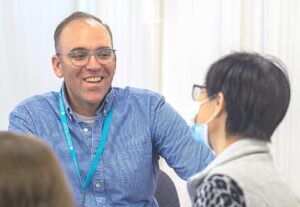
Powered by a small paid staff whose collective hours add up to three full-time positions and more than 100 volunteer doctors, nurses, translators, scribes, and others, the clinic has since grown into a primary care center that offers women’s health care and networks with specialists to provide about a half-dozen services on site.
Everything from physical therapy to eyecare, mental health to diabetes education, basic lab screenings, and prescriptions, all at no cost to the patient. Specialists rotate through, and what the clinic can’t provide in-house is referred out through a partnership with Project Access NOW.
“We’re free, so we are what’s considered the safety net of the safety net,” said Community Health Worker Yessica Galeana. Patients are all uninsured or underinsured, and many haven’t seen a doctor in years.
Ideally, the upgrades will also draw more volunteers, allowing them to increase operating hours and treat more people. They have been operating without central heat and air conditioning from the start.
“It’s actually a very minimalist project,” Executive Director Jordan Skornik said of the rebuild. “We just want to get a facility that works well with what we need and what our patients need. It’s not so we can have a nicer place. It’s so we can communicate to the patients that even though they’re getting free care, they are getting quality care. To me, it’s a dignity question. We want to dignify our patients here.”
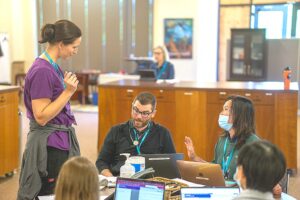
The campaign kicked off on June 2 with two-thirds of the total funding already in pocket from a combination of grants, private gifts, and savings, leaving a goal of $300,000 to begin construction and $500,000 to fund the project fully.
“It’s such a necessary thing in our community,” Ban said. “I always thought that my job was to travel the world and help people in poor countries. But (back then) I didn’t realize that we have so many vulnerable people right next door to us in our community.”
The clinic currently sees patients for four hours, two afternoons a week, but Skornik hopes the rebuild will quickly double those operating hours and one day expand to a full 40 hours, like the Salem Free Clinic that serves as its model.
Though they have a very limited capacity for walk-ins, most appointments are scheduled weeks in advance.
Operating hours are dependent on volunteers. The non-profit runs with a paid staff of four, including Skornik, Galeana and two additional part-time employees.
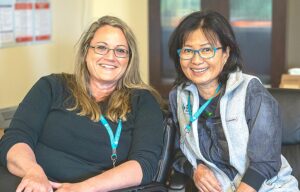
When Galeana, who is also the clinic’s patient scheduler, became certified as a Community Health Worker, it fulfilled a longstanding goal to add the service.
She now helps enroll eligible uninsured patients in the Oregon Health Plan, connects patients with specialist referrals, and conducts community outreach campaigns that raise awareness among those who need the clinic.
“Whatever they need, I always look into it,” Galeana said.
More than 300 people visited the clinic in 2022. Of those, about 55 percent returned for follow-ups, and about 28 percent were new patients. Nearly 70 percent were Latino, and about 3 percent were houseless.
“A lot of our patients are undocumented,” Galena said. “They don’t want to come to any clinic to be seen because they’re scared. It comes down to a lot of people being vulnerable, and just coming to a clinic for them is a big deal.”
Skornik anticipates the build will take two to three months, during which time the clinic will offer limited hours in an adjacent space, though the times and days may shift.
“We call this our MASH unit,” he said, referring to the make-shift exam rooms. “We will take our pop-up shop here and move it (next door). It will be reduced capacity in terms of the rooms we’ll have and therefore patients we can see.”
The rest of the organization will go full speed throughout, working to build its volunteer pool – last year 125 volunteers donated more than 5,300 hours – and attract more patients.
For more information on Tualatin’s Borland Free Clinic and fundraising campaign, visit www.borlandclinic.org.






